KILL THE DISCO
In hindsight, it might seem natural that punks (as well as more conventional rock fans) of the 1970s
would band together over their hatred of disco. Disco represented everything punk was not -- on the
surface, anyway. The disco scene was flashy, sassy, flamboyant and slick. The music relied heavily on what
was commonly referred to as "canned rhythm." According to punks and other detractors, disco was lifeless,
commercialized music packaged by the industry and greedily consumed by a zombie-like public.
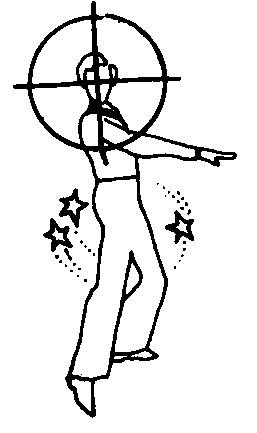 While the clientele and the music was different, disco and punk shared a number of similarities.
They both came from small clubs in New York (and later London), where outcasts created scenes of their
own design. And if anyone was flamboyant, flashy and reveled in excess, punks were, especially the early
punks from New York City; the New York Dolls epitomized attention-grabbing flamboyance.
While the clientele and the music was different, disco and punk shared a number of similarities.
They both came from small clubs in New York (and later London), where outcasts created scenes of their
own design. And if anyone was flamboyant, flashy and reveled in excess, punks were, especially the early
punks from New York City; the New York Dolls epitomized attention-grabbing flamboyance.
For punks, the scene was started by mostly white, knucklehead kids with nothing else to do; kids
who didn't really care for anything that was going on at the time. These were kids from the boroughs of New
York and from the cities farther away who gravitated to the Big Apple for some reason or other.
For disco, the scene was started largely by gays and blacks (and, naturally gay blacks) who
obviously didn't fit in anywhere. Like the young punks, they created their own scene, created their own
music. The difference is: disco caught on; punk didn't.
Today, many people like to think punk rock has always been about purposely working outside and
shunning the mainstream, that a clean divide has always existed between punk, disco and every other style of
music, for that matter. However, if you were around in the '70s, you're likely to remember a time when
dividing lines between genres weren't so hard and fast. A number of more open-minded music fans embraced
punk, disco, glam, heavy metal and nearly every kind of new music happening. And if you study your history
carefully, you'll see that many of the early punk bands were trying their damnedest to get noticed, get signed
and become rock 'n' roll stars.
Looking back, it's not hard to see why disco made it big and punk, for the most part, didn't. Besides
being utterly self-destructive and just downright frightening to anyone outside the scene, punk couldn't be
tamed (at least, not until the end of '70s). After coming out of the tumultuous '60s, out of Vietnam, the last
thing most people wanted was confrontational music, which is exactly what punk prided itself in being.
For older music fans, bands such as the Eagles provided the fix they needed. Younger people
wanted something more upbeat. They wanted their own music. They wanted to dance, get high and fuck.
Heavy metal did it for some kids. For others, disco came along at the perfect time.
Disco proved relatively easy to tame, shape into a marketable music craze. Once the music industry
white-washed it (in the process, shutting out and pissing off many of the people [blacks & gays] who helped
create it), everyone loved disco. Even the Rolling Stones and Blondie got into the game. That hurt especially
bad; the godfathers of punk and one of their own succumbing to disco.
Punks went on the offensive. In the March/April '78 issue of Punk, John Holstrom succinctly brings
to light the folly of disco in a cartoon called "Disco Mania."
And then there were the songs.
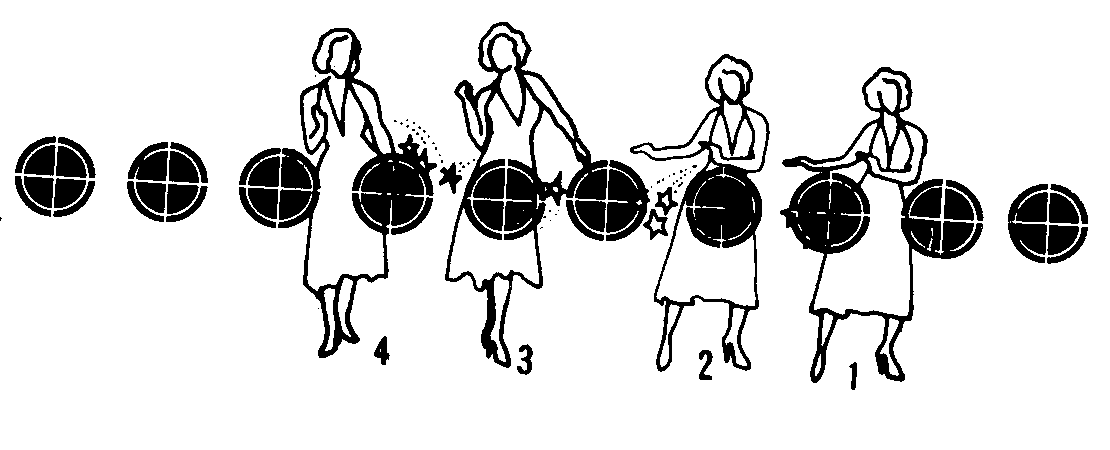
Anti-disco punk songs began cropping up in 1977. As disco and punk grew, so did the number of
anti-disco songs. It was a world-wide phenomenon, with bands in the US, UK, across Europe and Australia
adding their two cents on the proliferation of Saturday Night Fever, the Bee Gees, flashing dance floors and
mirrored balls. After a while, it became somewhat of a cliché. Punks wear safety pins, play loud, obnoxious
music and hate disco. Heavy metal, country-western and good old fashioned rock 'n' roll bands all got into
the act as well. Hating disco became almost as fashionable as disco itself.
The fact that disco originally sprung from gay clubs provided red-blooded American men - punk or
not - a specific scapegoat at which they could aim
their criticism and let their homophobia hang out in all its glory. Gay bashing and racism reared its head
often in the criticism of disco (by both punks and mainstream America). The above mentioned cartoon in
Punk makes numerous "fag" jokes and the New Orleans fanzine Final Solution derides disco as music for
"niggers" and "faggots." The virulent attacks on not just disco music, but its stereotyped culture came
partially as a reaction to a decade of women's rights, civil rights and gay rights battles.
The anti-queer sentiment and unbridled racism (against both blacks and people of middle eastern
descent) wasn't new to Punk and wasn't limited to a hatred of disco. Gay bashing was also a reaction against
the strong queer influence of early punk. Though such rock 'n' roll heroes as the New York Dolls, Lou Reed
and David Bowie all flaunted an ambigious sexuality, it didn't sit well with many of their fans. Macho boys
from middle America seemed especially threatened by the gender-bending. And of course, the anti-gay
charges lobbed at disco were shared by a majority of the population, even fans of disco. No, unfortunately,
the anti-disco sentiment wasn't just about lame music.
Below is an incomplete list of some of the more notable anti-disco songs from the early years of
punk. All these songs come from singles. Had I scoured LP track listings, the list would no doubt be
considerably larger.
Blitzkrieg -- "Rock 'n' Roll Is Dead" (Blitzkrieg Records)
Though not really an anti-Disco song, Blitzkrieg (from Germany) included "Rock 'n' Roll Is Dead,"
a short, snarling song on their first 7" from 1981 that puts all this bluntly in perspective. With disco's
enormous popularity, many people really felt rock 'n' roll was dead. But then, some critics and fans who
were around long enough thought rock 'n' roll had died before the Beatles washed ashore and died again at
Altamont. Others argue that rock 'n' roll as a popular music genre did indeed die with disco's popularity,
especially when surveying today's musical landscape of mainstream music.
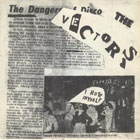 Razar -- "Stamp Out Disco" (Able Records)
Razar -- "Stamp Out Disco" (Able Records)
Australia's Razar has become a well known and much loved band among collectors and passive fans
alike. With songs like "Stamp Out Disco" (1978), it's easy to see why. You can feel their seething distaste
for polyester pantsuits and wah-wah pedals as they yell the chorus.
Vectors -- "Death To Disco" (Chateu East Records)
Thanks to Rave-Up Records' recent reissue, many collectors and punk historian types can now
revel in the sounds of the Vectors, including their biggest (non) hit, "Death to Disco." Originally released in
1979 at the height of disco fever.
Rotters -- "Disco Queen" (Rotten Records)
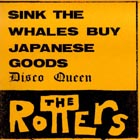 The Rotters (Los Angeles, 1979) take a different approach in expressing their hatred for disco. This
song is one of the few to actually attack not just the music, but also the culture. Their little jab at
homosexuals (the queen about which they're referring isn't a woman) may seem innocuous and silly enough,
especially given that it's relatively mild and fun-spirited compared to other punk songs that express decidedly
conservative views regarding sexual preferences. Still, it brings to light that for many people, their distaste
for disco went beyond just the music.
The Rotters (Los Angeles, 1979) take a different approach in expressing their hatred for disco. This
song is one of the few to actually attack not just the music, but also the culture. Their little jab at
homosexuals (the queen about which they're referring isn't a woman) may seem innocuous and silly enough,
especially given that it's relatively mild and fun-spirited compared to other punk songs that express decidedly
conservative views regarding sexual preferences. Still, it brings to light that for many people, their distaste
for disco went beyond just the music.
Disco Zombies -- "Disco Zombies" (Uptown Records)
England's Disco Zombies take their name to heart with this droning anti-disco song, released in
1979. For some reason, disco fans were often seen as being mindless zombies.
Vibrators -- "Disco In Mosko" (Rak Records)
This later Vibrators song pales in comparison to the material from their early singles and debut
album. Still, "Disko in Mosko" fits well with the theme. It's one of many songs that in expressing contempt
for disco, mocks it by using that awful hi-hat based disco rhythm as the backbone of the song.
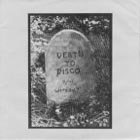 Jimi LaLumia + Psychotic Frogs -- "Death To Disco" (Death Records)
Jimi LaLumia + Psychotic Frogs -- "Death To Disco" (Death Records)
Leave it to New York City's Jimi LaLumia + Psychotic Frogs to do an extended (anti) dance mix
song as an anthem calling for "Death To Disco."
D.O.A. -- "Disco Sucks" (Sudden Death/Quinetessence)
One of the best-known anti-disco songs, "Disco Sucks" provides the title to Canada's D.O.A.'s very
first single, released in 1978. What a great start to their long career, no?
Chosen Few -- "Disco Tek Wreck" (Chosen Few Records)
How did Radio Birdman's Deniz Tek get sucked into the Chosen Few's (Australia) diatribe against
disco, released on their one and only e.p.? You got me, but it's an awesome song.
Vanalles & Nogwatt -- "Disco Binken" (Small Punx Records)
Who are Vanalles & Nogwatt? Well, it turns out they were actually two Dutch bands who shared a
split single on Small Punx Record that came out in 1983 or '84. I'm not sure which of the two bands
recorded this song, "Disco Binken." Hell, I'm not even sure what "Binken" means, but I doubt they're
singing about how much they love John Travolta.
Dirt Shit -- "Discosheisser" (Razz Records)
In the same year (1979), Austria's wonderfully named Dirt Shit romped through their storming
song, "Discoscheisser." Pull out your Germany dictionary for a translation.
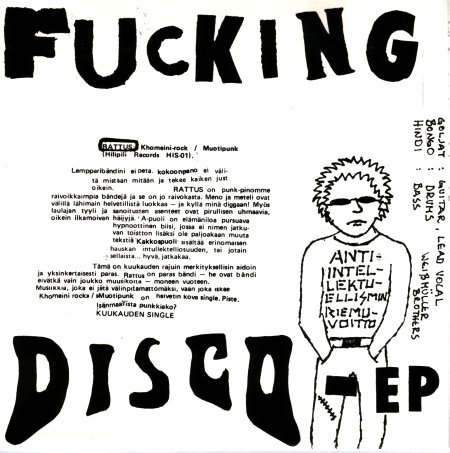 Rattus -- "Fucking Disco" (Hilipili Records)
Rattus -- "Fucking Disco" (Hilipili Records)
Finland's Rattus don't fuck around. The blistering "Fucking Disco" comes from their second 7",
released in 1981, as disco was in a steady nosedive.
Bleach Boys -- "Death Before Disco" (Tramp Records?)
The Bleach Boys, from Canada released "Death Before Disco," on their amazing above 12", which
came out in 1982. Good luck finding a copy.
Epileptix -- "Disco Slut" (GMM Records)
The only band on here from the '90s ('97 to be exact), the Epileptix show us they not only look and
sound like they were from the late-70s, but they even peg the subject matter in their song "Disco Slut." In
doing research for this article, I fully expected (and hoped) to come across anti-techno punk songs from the
'90s, but found only a handful.
Skams -- "Discoglin" (Betong Records)
Skams' song "Discoglin," might be an anti-disco song. Since it came out in 1979, I'm inclined to
think it was, but I don't know Swedish, so I can't tell you for sure.
Accident -- "Kill the Bee Gees" (No Threes)
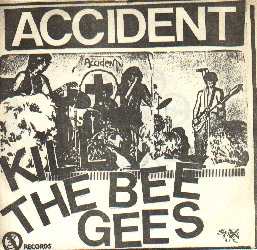 One of the best, most classic anti-disco songs, "Kill the Bee Gees" by the Accident came out in
1979. Melodic, yet fierce, a nearly perfect punk song.
One of the best, most classic anti-disco songs, "Kill the Bee Gees" by the Accident came out in
1979. Melodic, yet fierce, a nearly perfect punk song.
Johnny Yen Bang -- "Kill the Disco" (?)
Johnny Yen Bang offer a simple solution to our disco dilemma, "Kill the Disco." Easy enough.
They were from Norway and released this song in 1980.
The Damned -- "Disco Man" (Sudden Death)
This Damned song was recorded live in 1994 and released in '98. Though it's no "New Rose" or
"Neat Neat Neat," it fits well here.
Government -- "Hemingway Hated Disco Music" (Government Records)
Another Canadian band weighs in on the matter in "Hemingway Hated Disco Music" by
Government, recorded in 1979. Maybe disco dribble is why Hemingway hunted himself down?
The Business -- "Smash the Discos" (Secret Records)
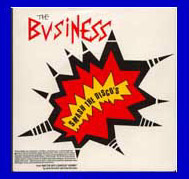 Though their song makes no racist comments, on the cover of the "Smash the Disco" single, the
Business make reference to "Uncle Toms with afros..." This is the last time I'll bring this up, I swear. While I
can 100% get behind hating disco for being mindless, gutless, packaged beats, using blacks and gays as
targets is fucked up. Besides that, it's a cheap shot. No one ever accused punks of being smart, but come on,
that shit has all the originality of a Family Circus cartoon. There are plenty of legitimate reasons to hate
disco. Because it sprang from black and gay culture isn't one of them. At this point, I will point you to
Lester Bangs' essay, "White Noise Supremacy" from Psychotic Reactions and Carburetor Dung (read it
again if you already read it; get someone to read it to you if you can't read) and move on with the notes...
Though their song makes no racist comments, on the cover of the "Smash the Disco" single, the
Business make reference to "Uncle Toms with afros..." This is the last time I'll bring this up, I swear. While I
can 100% get behind hating disco for being mindless, gutless, packaged beats, using blacks and gays as
targets is fucked up. Besides that, it's a cheap shot. No one ever accused punks of being smart, but come on,
that shit has all the originality of a Family Circus cartoon. There are plenty of legitimate reasons to hate
disco. Because it sprang from black and gay culture isn't one of them. At this point, I will point you to
Lester Bangs' essay, "White Noise Supremacy" from Psychotic Reactions and Carburetor Dung (read it
again if you already read it; get someone to read it to you if you can't read) and move on with the notes...
Dicks -- "All Night Fever" (Radical Records)
The amazing Dicks weigh in with "All Night Fever" off their stunning first 7", released in 1981. By
'81, discos were going the way of John Travolta's career, but the memory still lingered and stung.
Rotzkotz -- "Disco Sound Is Dead" (?)
Germany's Rotzkotz remind us that, thankfully, "Disco Sound Is Dead." However, in 1979, these
punks couldn't have seen the unfortunate rise of a new electronic sound, the scourge of today's
music-techno. Ugh.
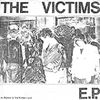 Victims -- "Disco Junkies" (Victims Records)
Victims -- "Disco Junkies" (Victims Records)
Finally, our old Australian friends the Victims let you soak your head in a loud wash of drawn out
noise in their classic "Disco Junkie." After all, we are all closet disco junkies, right?
If it weren't for disco, think of all the wonderful music we would have been deprived of.
-Mark Murrmann
PREVIOUS PAGE HOME NEXT PAGE
|

